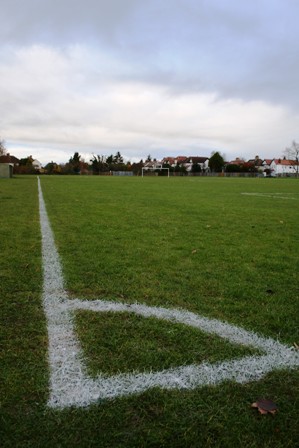
Edition number 68; dateline 5 November 2013
John Barnes reminds us that it is not all over
It is a truth universally acknowledged that football is a funny old game. But not as funny as it should be.
Decades of professionalisation, monetisation and internationalisation of the people’s game and its custodian bodies have put football at the pinnacle of global visibility but, in common with Formula One, it has become a sport where nothing is allowed to get in the way of the business; and because the business has become indistinguishable from the money-making, the money-making has become indistinguishable from the sport.
But just as there are still some people who race cars for fun at the weekend, whether up steep hills or round small circuits with names redolent of string-backed gloves and open-face helmets, there are still plenty of people who kick a ball around a park just for the enjoyment. This was acknowledged by the Football Association a few years ago when it divided the game into two administrative elements, one of which – the non-professional bit – was to be referred to as “the National Game”.
This left us free to ponder the question of where the professional game stops and the national game begins; or where the business stops and the fun starts. A report in this issue from our pitchside correspondent suggests that this line in the mud is a lot further away from Wembley than many of us might have guessed. It seems that players get paid to play, and coaches to coach, quite a long way down the footballing pyramid with, our report suggests, a significant impact upon how and by whom the game is played. This report comes as an addition to the ongoing coverage in The Leisure Review of some of the practices and habits of coaching over the years which suggest that for many young people the fun has already left the game by the time they get to pull on a shirt that is part of a matching set.
That sport can become subsumed by a business ethos and the simplistic logic of professionalism is not unique to football – a similar approach to remuneration has been a feature of rugby for some time and the union code has had, and continues to have, its own extensively documented struggles with similar issues – but the ubiquity of football and the scale of the finance involved arguably makes it unique.
Of course, not everyone in football has been corrupted by money but the influence of money is insidious. The implications and inferences of vested interests, commercial opportunities and the self-censorship of anyone hoping to make their way in the game are part of the process that enables money and those who control it to remove things from the public realm, appropriating them in plain site before anyone can realise that ownership is at stake.
For this reason it was notable that John Barnes, writing in the Guardian, chose to speak out so forcefully against racism not just in football (in fact he dismisses its significance) but in society in general. The surprise was not that the case was argued intelligently and eloquently (Barnes is intelligent and eloquent) but that someone so closely associated with the professional game felt able to speak out. But of course while he may be closely associated with the professional game, he is not central to it. He is an outsider, which demonstrates our point regarding insidious influences and his own point (although he makes no such claims on his own behalf) about racism in game as a reflection of racism in wider society.
In professional cycling, another sport struggling with some difficult issues, many of which arguably have financial origins, the process of speaking out against the accepted culture of complicity is – or was until very recently – referred to as ‘spitting in the soup’. In this case only once someone had picked up this particular bowl and poured the contents all over the table and the heads of those sat round it could the sport’s problems be properly addressed. This radical change from spit to spill has done massive damage to professional cycling but most involved in the sport recognise that it is necessary if a new way is to be found to manage the kitchen and come up with something palatable. While so many sports are busily taking lessons from cycling in terms of coaching, psychology and preparation, lets hope that football can learn this one, if only to save us from further tortuous culinary analogies.
The simple pleasures of sport and leisure among friends and fellow enthusiasts are central to any concept of quality of life. National governing bodies tend, and are encouraged and enabled, to forget the fun in pursuit of the finance. It requires individuals with courage and a properly calibrated ethical compass to speak out and remind them of what is important.
Jonathan Ives
Editor
You can find John Barnes' comment piece for the Guardian online at www.theguardian.com/football
letter from the editor
The Leisure Review editorial
